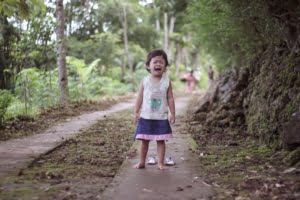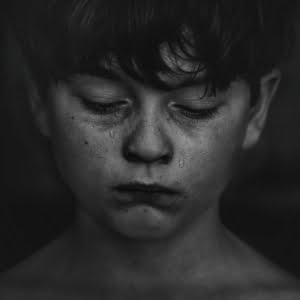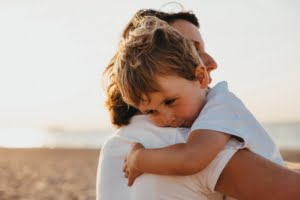Children should grow up in a world where the only physical trauma they know is a scraped elbow from falling off their bike or a skinned knee from playing tag with their friends. Children should grow up in a world where their biggest concerns are remembering to do homework and putting their toys away after hours of playing and giggling. Children should grow up in a world where they are excited to face a new day, meet new people, and experience a world that is full of hope and endless possibilities.
 Unfortunately, children are exposed to traumatic experiences that mold and shape who they are and what they want to be. Traumatic situations can cause a child to develop low self-esteem, hinder their ability to focus, and can cause nightmares and other physical and emotional ailments. San Diego Christian Counseling can provide support in addressing and overcoming these challenges.
Unfortunately, children are exposed to traumatic experiences that mold and shape who they are and what they want to be. Traumatic situations can cause a child to develop low self-esteem, hinder their ability to focus, and can cause nightmares and other physical and emotional ailments. San Diego Christian Counseling can provide support in addressing and overcoming these challenges.
Trauma can affect a child’s ability to find joy, leave them fearful of the future, and frightened to face a new day. Trauma can leave children searching and longing for a safe place; a place full of love, joy, and reassurance to chase their dreams. Trauma can take away a child’s potential, because of their unbelief in themselves and in the world around them.
Trauma is an intense rocking or shifting of the emotional boat. It is an event or multiple events that alter normal functioning and make it difficult to feel safe. It is as if a child’s world has been completely turned upside down and they have no idea how to process it and continue moving forward.
Instances, such as abuse, rape, observing a parent commit suicide, and losing a loved one or best friend, are a few of the many firsthand trauma experiences children face today. Bullying, medical conditions, natural disasters, and violence are a few of the many forms of trauma that children may be exposed to or deal with one or multiple times in their young upbringing.
Secondary trauma, an overlooked form of trauma, is where a child hears about firsthand trauma or sees the effects on loved ones or bystanders, which can also leave their world feeling unstable and leave them unable to function normally.
It can leave them feeling fearful, unsure of how to put together the words to ask for clarity or help to decipher what is going on around them. Children are still in the process of trying to figure out and decrypt their emotions, which is why it is so important to talk to them and create a safe space during times of uncertainty and tragedy.
Helping Children Cope with Trauma
 The overall emotional and physical effects of trauma may vary from person to person. Coping skills may vary based on trauma exposure, past trauma, upbringing, surroundings, or the interactions presented while they are trying to process their emotions during a traumatic event of any kind.
The overall emotional and physical effects of trauma may vary from person to person. Coping skills may vary based on trauma exposure, past trauma, upbringing, surroundings, or the interactions presented while they are trying to process their emotions during a traumatic event of any kind.
It is pivotal to make your presence known to a child experiencing the effects of trauma. Ask them how they are doing and let them know that you are available for them to ask questions.
More importantly, supporting adults need to continue checking in on them and their progress during difficult times. It is important not to assume that because they seem quiet and fine one day does not mean they are not having a difficult time processing horrific events they have heard about or experienced.
Schedule a counseling session for your child so they can talk through major events, such as abuse, bullying, or the loss of a loved one. Childhood development plays such a fundamental role in the foundation for their future, so being there for them and working through difficult times can help them instrumentally as they mature into adulthood.
Know that warning signs are not always obvious.
The warning signs are not always obvious when a child is struggling to process events emotionally. They may begin lashing out or having outbursts of anger, or they may retreat and become quiet, unsure of what to say or how to ask for help.
They may blame themselves for an event that has happened, such as the sickness of a parent or death of a loved one. Bullies and abusers often speak to victims as if it is their fault for something that has happened; leaving them feeling alone, at fault, and unsure of how to handle the situation.
Start the conversation.
 It is important for supportive adults and parents to ask the right questions. Adults may be unaware of any abuse or bullying that has occurred or is reoccurring in a child’s life, so it is important to start the conversation. Teach them about abusive behaviors and what to do when they are being bullied.
It is important for supportive adults and parents to ask the right questions. Adults may be unaware of any abuse or bullying that has occurred or is reoccurring in a child’s life, so it is important to start the conversation. Teach them about abusive behaviors and what to do when they are being bullied.
Talk to your child about abuse, bullying, or other specific events that are happening around them. Encourage them to ask questions and know it is okay to express their emotions. Starting the conversation and teaching children about emotions and feelings will help with trauma-specific feelings and in their day to day life.
Have a support system in place. Create a safe space.
It is imperative that every child knows that someone is there for them. It is important for every child to have a safe place to express their feelings and ask questions without being judged. Parents, teachers, and other supportive adults can let children know that they are physically present and emotionally there for them.
 It is vital to support children while they are dealing with a specific event but to continue checking in on them for months and months to come. Some trauma symptoms, like nightmares, can take quite a while to take root after a traumatic event.
It is vital to support children while they are dealing with a specific event but to continue checking in on them for months and months to come. Some trauma symptoms, like nightmares, can take quite a while to take root after a traumatic event.
After an event has occurred, a child needs to know that is okay to be frustrated, angry, or afraid. Children should be given effective coping tools and outlets to deal with and process the frustration, fear, or anger. Some children respond well to art to express their emotions while others do well with breathing exercises to relax when they are feeling anxious.
Outlets, such as sports, music, or playing with animals are also helpful in helping children work through their emotions. A safe space may simply be a play area with calming tools, such as picture books, bubbles, art supplies, and stuffed animals. Create emotional and physical space based on the child and their likes/dislikes.
Be aware of compassion fatigue
Too often, teachers and parents who are trying to help a child deal with and process traumatic events do not realize the physical and emotional toll it can take on them. Helping others and aiding others in their healing journey can leave the helpers emotionally fatigued because it is not a simple task to help others process their trauma.
Compassion fatigue can also take a toll on the helpers when they have unresolved trauma. It is pivotal to attend to self-care, have a strong support system, and schedule your own counseling session to deal with unresolved trauma.
It is important to know that children and adults alike deal with and process trauma differently. Some may not feel the effects in their sleep patterns or in their sense of safety while others do. Some may have nightmares and act out, while others do not. Do not compare one person’s specific symptoms to someone else.
Know that it is okay to grieve and seek professional help while trying to address one specific event or a lifetime of trauma. It is important for children and adults to both have a safe place to share and process their feelings. It is pivotal to have a strong support system and not to keep emotions bottled up.
Schedule Trauma Counseling for Children
Trauma counseling is available for both children and adults. Trauma counseling can address trauma from years ago or deal with current loss, fear, and uncertainties that leave both children and adults feeling fearful and uncertain of how to process their emotional turmoil.
Instances, such as witnessing a suicide, or being abused or bullied, are all life-changing situations that affect one’s abilities to feel safe, regardless of the victim’s age. Schedule a session today with a Counselor at San Diego Christian Counseling, to work on effective coping skills, find your trauma triggers, and address the trauma in a safe, healthy, non-judgmental environment.
“Little Girl Lost”, Courtesy of Arwan Sutanto, Unsplash.com, CC0 License; “Tears”, Courtesy of Kat J, Unsplash.com, CC0 License; “Carried by Mom”, Courtesy of Xavier Mouton Photographie, Unsplash.com, CC0 License; “Difficult Roads”, Courtesy of Hello I’m Nik, Unsplash.com, CC0 License


